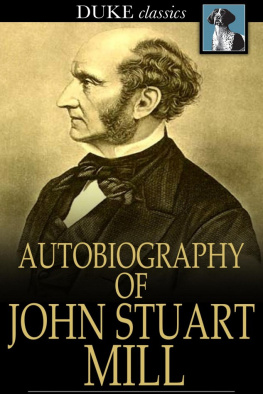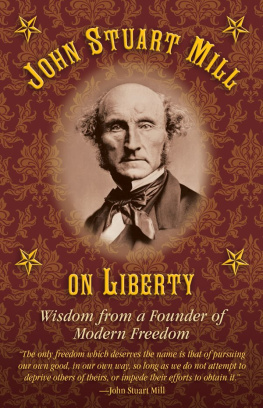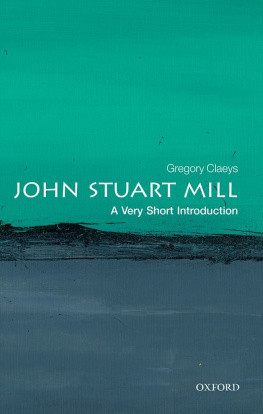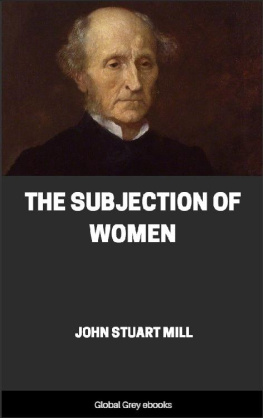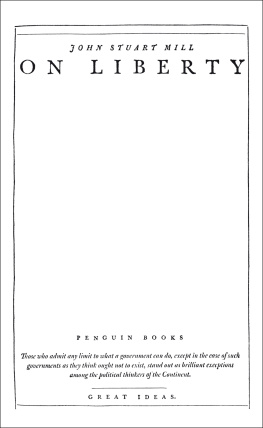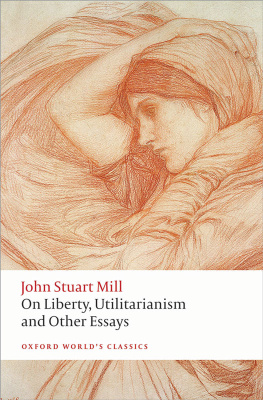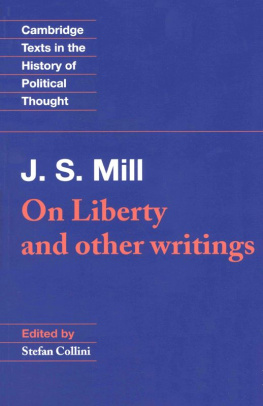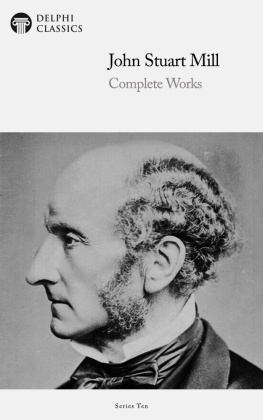
ON LIBERTY and THE SUBJECTION OF WOMEN
JOHN STUART MILL was born in London in May 1806. His father, James Mill, was at that time a journalist but subsequently became an assistant to and propagandist for Jeremy Bentham, and eventually a senior civil servant in the East India Company; his mother, Harriet Burrow, was the daughter of a modestly well-off asylum keeper. Mill was highly intelligent and received an extraordinary education at the hands of his father: he learned Greek at the age of three and by his teens was a good logician and a fluent economist, as well as very widely read in classical literature and ancient and modern history. The purpose of this education was to train him to be the intellectual leader of Philosophical Radicalism, the movement for political and administrative reform organized around Jeremy Bentham and James Mill.
By the age of twenty he was all that his teachers hoped. But in 1826 he suffered a nervous collapse and found he no longer subscribed to the creed in which he was brought up. He then set out to re-educate himself by reading opponents of the creed in which he had been reared, such as Coleridge, Carlyle, the St Simonians, Comte and Tocqueville. In 1830, he fell in love with Harriet Taylor, a married woman with small children; their chaste but anguished relationship was a further element in his re-education. All the while, however, he wrote for the Radicals journal, The London and Westminster Review, and defended the Radicals political programme.
In the 1840s Mill established the basis of advanced thought in Britain with A System of Logic (1843) and Principles of Political Economy (1848); between 1859 and 1865 he wrote, but did not always publish, the works for which he remains famous. These include On Liberty (1859), Utilitarianism (1861), Considerations on Representative Government (1861) and The Subjection of Women (published in 1869), as well as Three Essays on Religion, Chapters on Socialism and much of his Autobiography, all of which appeared posthumously.
Mill worked for the East India Company from 1823 to 1858 and retired when the Company was dissolved in the wake of the Indian Mutiny. He served as Member of Parliament for the Westminster constituency, arguing for the rights of women, the rights of the Irish and the rights of trade unionists. He married Harriet Taylor in 1851, and after her death in 1858 he spent six months of every year at Avignon to be near her grave. He died there in 1873 and is buried in the same grave.
ALAN RYAN is the Warden of New College, Oxford, and before that was Professor of Politics at Princeton University. He is the author of The Philosophy of John Stuart Mill and J. S. Mill and the editor of the Penguin Classics edition of Utilitarianism and Other Essays. He has written extensively on liberal political theory, both in a historical and contemporary context.
JOHN STUART MILL
On Liberty and
The Subjection of Women
Edited by ALAN RYAN
PENGUIN BOOKS
PENGUIN CLASSICS
Published by the Penguin Group
Penguin Books Ltd, 80 Strand, London WC2R 0RL , England
Penguin Group (USA) Inc., 375 Hudson Street, New York, New York 10014, USA
Penguin Group (Canada), 90 Eglinton Avenue East, Suite 700, Toronto, Ontario, Canada M4P 2Y3 (a division of Pearson Penguin Canada Inc.)
Penguin Ireland, 25 St Stephens Green, Dublin 2, Ireland (a division of Penguin Books Ltd)
Penguin Group (Australia), 250 Camberwell Road, Camberwell, Victoria 3124, Australia (a division of Pearson Australia Group Pty Ltd)
Penguin Books India Pvt Ltd, 11 Community Centre, Panchsheel Park, New Delhi 110 017, India
Penguin Group (NZ), cnr Airborne and Rosedale Roads, Albany, Auckland 1310, New Zealand (a division of Pearson New Zealand Ltd)
Penguin Books (South Africa) (Pty) Ltd, 24 Sturdee Avenue, Rosebank, Johannesburg 2196, South Africa
Penguin Books Ltd, Registered Offices: 80 Strand, London WC2R 0RL , England
www.penguin.com
On Liberty first published 1859, The Subjection of Women 1869
Published in Penguin Classics 2006
Editorial material Alan Ryan, 2006
All rights reserved
The moral right of the editor has been asserted
Except in the United States of America, this book is sold subject to the condition that it shall not, by way of trade or otherwise, be lent, re-sold, hired out, or otherwise circulated without the publishers prior consent in any form of binding or cover other than that in which it is published and without a similar condition including this condition being imposed on the subsequent purchaser
ISBN: 9781101488232
Contents
Chronology
1748 Jeremy Bentham born in London, 23 February.
1773 James Mill born at Logie Pert, Scotland, 6 April.
1776 The Declaration of Independence issued 4 July; publication of The Wealth of Nations by Adam Smith.
1789 Bentham publishes Introduction to the Principles of Morals and Legislation; storming of the Bastille 14 July.
1805 James Mill marries Harriet Burrow 5 June; birth of Alexis de Tocqueville 29 July.
1806 John Stuart Mill born in London 20 May; 14 October, battle of Jena gives Napoleon mastery of Europe.
1807 Harriet Hardy born in London 8 October.
1808 Friendship of James Mill and Bentham begins.
1809 J. S. Mill begins to learn Greek.
1815 Battle of Waterloo ends the Napoleonic era.
1817 James Mill publishes History of British India.
1819 James Mill appointed to East India Company; Peterloo Massacre.
1820 James Mill publishes essay on Government in Encyclopaedia Britannica.
1823 J. S. Mill joins East India Company.
1826 Harriet Hardy marries John Taylor.
1832 Bentham dies 6 June; passage of First Reform Bill.
1835 First volume of Alexis de Tocquevilles Democracy in America published: reviewed by J. S. Mill.
1836 Essay on Civilization published; James Mill dies of consumption 23 June.
1838 Essay on Bentham published.
1840 Essay on Coleridge published; second volume of Democracy in America published: reviewed by Mill.
1843 Publication of A System of Logic.
1848 Publication of Principles of Political Economy; abortive revolutions in France, Germany and much of eastern Europe; Communist Manifesto published by Karl Marx and Friedrich Engels.
1850Coup dtat brings Louis Bonaparte (Napoleon III) to power.
1851 Mill and Harriet Taylor marry; Emancipation of Women published.
1852 Essay on Whewell on Moral Philosophy published.
1856 Mill appointed Chief Examiner of India Correspondence at the East India Company.
1857 Indian Mutiny ( March 1857June 1858).
1858 East India Company abolished; retirement of Mill; death of Harriet Taylor Mill at Avignon 3 November.
1859 Publication of On Liberty.
1861
Next page








